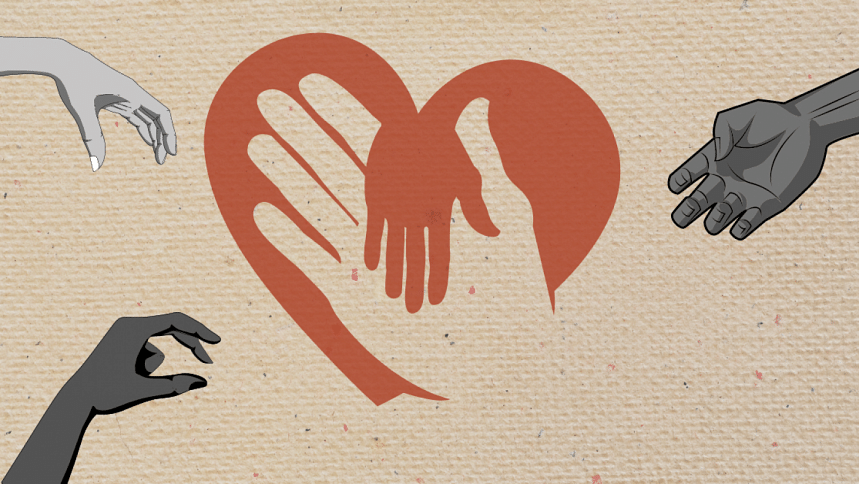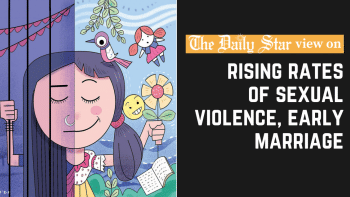Ayat and beyond: Where are our children’s rights?

Five-year-old Ayat had been on her way to the local mosque in the EPZ area of Chattogram, for her Arabic lesson on November 15, as part of her regular routine. But she never reached the mosque; she had been abducted. While there were only a handful of reports on this in the mainstream national media – though some television channels did allocate a little airtime to report this – social media had been abuzz with people sharing the posts from her family (with a photo of Ayat wearing an Argentina jersey) asking for help from the greater netizen community in finding her. On November 25, 10 days after her disappearance, police reported Ayat's murder.
It has been revealed by the PBI team in charge of the case that a youth named Abir Ali – a former tenant of Ayat's family – had abducted her for ransom. An unemployed youth, whose parents had recently separated, Abir wanted easy money to buy himself a CNG-run auto rickshaw. Realising that he had no place to hide Ayat and that he might get exposed, Abir strangled her to death. Later, to get rid of her dead body – inspired by Indian TV shows like CID And Crime Patrol – he chopped it into pieces and dumped them in the sea. As of writing this, although the police are yet to find the parts of the little dismembered body, they could recover the instruments that had been used for the murder, based on Abir's confession.
This tragic incident has sparked off certain questions about the rights of our children and our ability to address them. A report titled, "The State of Children in Bangladesh 2021," by Manusher Jonno Foundation (MJF) – published earlier this year – revealed that cases of child abuse increased in 2021 in comparison to 2020. These incidents of child abuse included death, rape, and attempted murder, among others. While 626 children were raped in 2020, the figure rose to 818 in 2021. Of these victims, 10 were boys. Similarly, while 145 children were murdered in 2020, the cases increased to 183 in 2021. The MJF report was based on news reports published in only eight newspapers during the year. Given that there are more than a thousand registered news outlets in the country, if reports from all of them were to be compiled, one can only imagine what the number of cases would rise to.
Citing media reports, Prothom Alo suggested that, in 2021, 2,426 children had faced abuse in various forms including murder, rape, attempted murder, attempted rape, abduction, torture, etc. In 2020, the number of cases stood at 1,420.
Bangladesh Shishu Adhikar Forum suggested that 1,005 children were raped in the country in 2021, which is an alarming 76 percent increase in comparison to 2020. What is even more blood-curdling is that 133 of these children were aged between one and six years.
And many more cases remain unregistered because of social stigma, reprisal from influential criminals, and at times even non-cooperation from law enforcers.
One might ask why, despite the increasing number of death penalties being handed to child murderers, are cases still on the rise. One of the reasons behind this is the much-talked-about slow pace of trials and even slower delivery of justice. Between 2015 and 2019, of the 3,136 cases filed, verdicts were delivered only for 164 cases. A 2020 report in Prothom Alo suggested that more than 200,000 cases were pending with the woman and child repression prevention tribunals countrywide, with some of them being pending for over a decade.
In the view of such a paltry demonstration of justice, and being safe in the knowledge that they can get away with such crimes, these abusers and murderers feel emboldened to prey on vulnerable, innocent children.
Social degeneration and corruption of the social fabric is another reason why such crimes are on the rise. The aforementioned MJF report added that a majority of the children had been lured in and raped by their neighbours, and some even by their family members. In the face of such gruesome truths, one wonders where our children are supposed to find safe spaces to grow and thrive in. We must ask ourselves why our family, friends, and neighbours are able to target our children to satiate their grotesque, unnatural temptations. What is triggering such barbaric desires?
In the face of social injustice, and social and economic disparity, perhaps we are losing our humanity and becoming more cruel. The unemployed Abir Ali, abducting a five-year-old for money, is perhaps a manifestation of this.
Most parents, upon reading about the unfortunate fate of Ayat, must have felt a shiver run down their spine. They must have turned to look at their children – perhaps playing with their toys or watching their favourite cartoons on the weekend. And while they might have initially heaved a sigh of relief that their children were safe, they must also have felt an unknown fear for their little ones. Who knows who the next target is? Who knows where the next criminal is lurking?
It is high time for policymakers and the judiciary to take a hard look at why, despite the addition of new Women and Children Repression Prevention Tribunals to ensure speedy disposal of pending cases, backlogs still remain. The backlogs must be sorted immediately, necessary punishment must be handed to criminals, and justice should be delivered, for all to see and understand that crimes in this country cannot go unpunished.
At the same time, the government should also strengthen the social service mechanism and expand its coverage to protect child rights. While earlier in the year the government had committed that they would recruit 6,000 additional social workers, taking the total to 9,000, considering the daily amount of violence our children face, these numbers are just not good enough.
We, as a society, should also remain extra vigilant to understand what our children are thinking, experiencing, and enduring. We should have more frank conversations with our children about their rights, including their right to privacy, and empower them with knowledge and awareness.
If we see something wrong happening, inside or outside the perimeter of our household, we should speak up against it and make sure that criminals are handed over to law enforcers – no matter who the criminals are. One cannot help asking, when Abir was walking off with Ayat, why did no one ask where he was taking her? Just because a person is an acquaintance, is it alright to let a child go anywhere alone with them?
We cannot allow our children to get victimised by criminals. As a society, we should collectively be aware, vigilant, vocal, and stand up for the rights of our children in order to ensure a safe space for them. While this may be easier said than done, the alternative (that is, our inaction) would mean that our children will never be safe.
Tasneem Tayeb is a columnist for The Daily Star. Her Twitter handle is @tasneem_tayeb


 For all latest news, follow The Daily Star's Google News channel.
For all latest news, follow The Daily Star's Google News channel. 






Comments